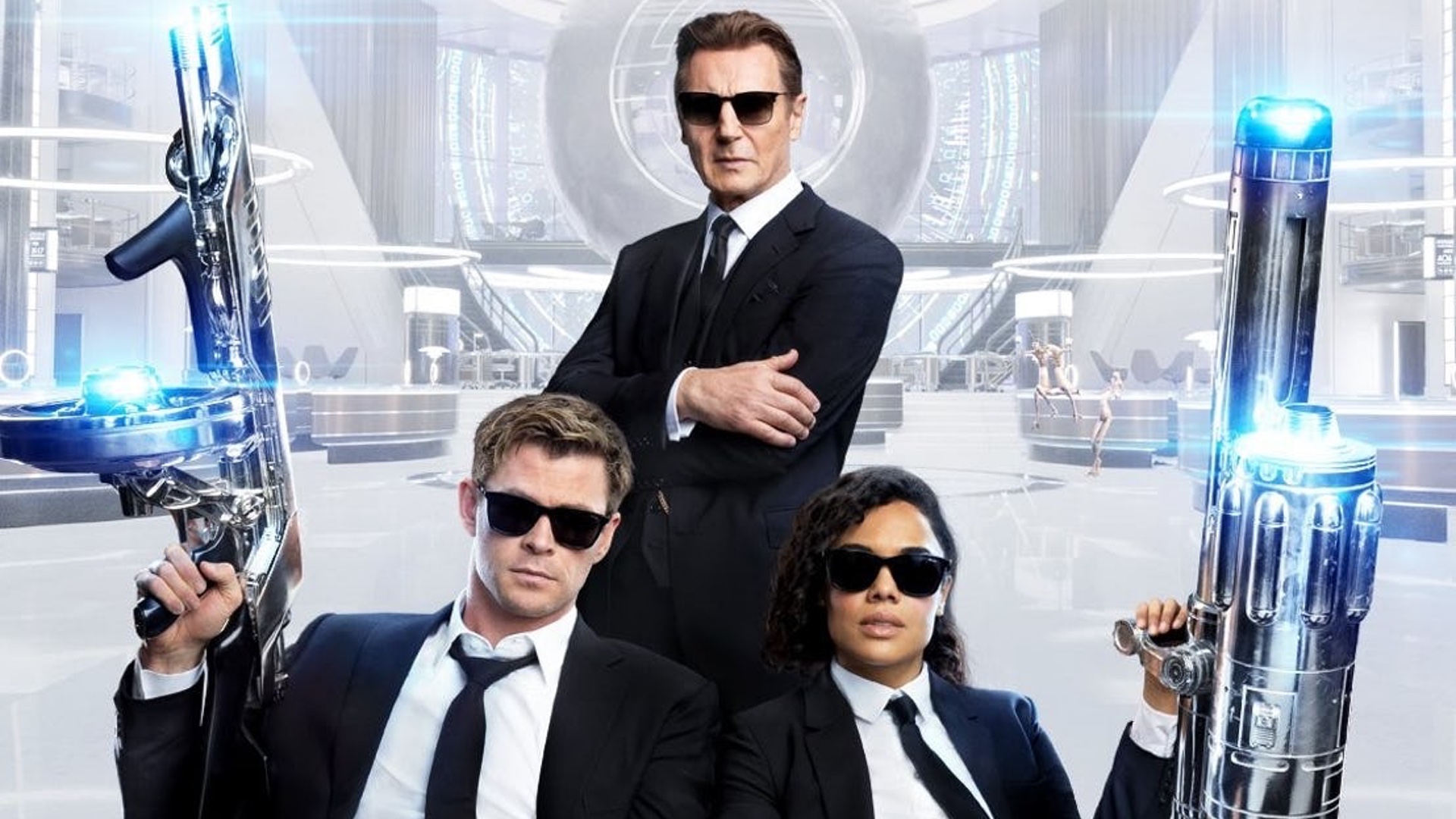Men in Black is one of those movie franchises that has always struggled to translate into the 21st Century. It’s a bizarre shortcoming that has consistently plagued Sony Pictures’ otherwise fun and creative sci-fi blockbuster franchise, adapted in turn from a lesser-known comic book series, years before comic book movies would go on to rule Hollywood. Still, the draw of lead star, Will Smith has at least somewhat kept the Men in Black sequels’ box office afloat, despite less than enthusiastic critical reception, particularly toward the dismal Men in Black II. With the coming and going of Men in Black 3 in 2012 as well, Will Smith, along with co-star, Tommy Lee Jones, have officially wrapped up their time with the franchise, putting Sony in a pretty uncomfortable position when it comes to trying to keep Men in Black relevant and viable in the modern era.
With experimental ideas that ranged from a full reboot to a crossover effort with Sony’s fan-favourite 21 Jump Street movies (yes, seriously), Men in Black eventually settled on a premise for a soft reboot, picking up many years after the events of the previous movies, in a mostly disconnected storyline that only sparingly references the lore from the original Men in Black trilogy. Thus, Men in Black: International was born, an attempt to expand the Men in Black movie universe with new characters in a new setting, far removed from the original trilogy’s New York City backdrop. Better still is that Men in Black: International secured some big talent for the franchise’s new lead roles, namely Chris Hemsworth and Tessa Thompson, both talented stars on their own merits, while also already having established on-screen chemistry, after working together in two of Marvel Studios’ most exceptional sequels, Thor: Ragnarok and Avengers: Endgame. For the first time in a while, it seemed like Men in Black might actually have a serious shot at rejoining Sony’s blockbuster movie lineup in earnest!
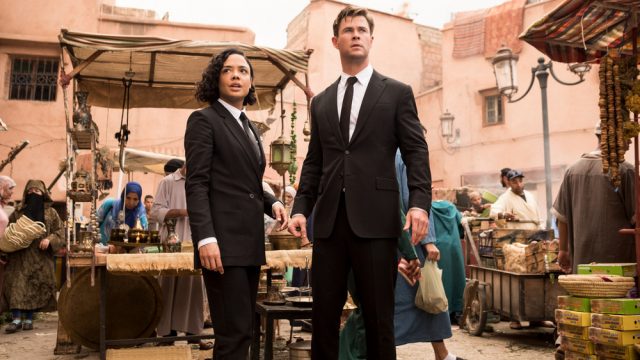
Right from the first trailer however, it was evident that Men in Black: International didn’t seem to capture the same charm as the original trilogy. Now that the actual movie is out as well, I can unfortunately confirm that Men in Black: International has practically none of the original Men in Black trilogy’s charm, squandering its great lead stars on a disappointingly shallow storyline that both fails to expand the Men in Black movie universe in any meaningful way, and fails to work as a soft reboot that aims to revitalize Men in Black as a blockbuster franchise for Sony’s portfolio. In fact, Men in Black: International seems as confused by its own existence as the audience inevitably will be, churning out a very disposable sci-fi romp that’s forgettable at best, and a complete waste of time at worst.
With former protagonists, J and K now out of the franchise, Men in Black: International instead picks up from the perspective of a new protagonist, Tessa Thompson’s Molly Wright. After witnessing her parents get neuralyzed, following an alien encounter, Molly becomes obsessed with locating the incredibly hidden MIB organization, working well into her thirties to go through every government intelligence organization’s ranks, in an effort to discover where MIB is hiding. Eventually, Molly does locate them as well, pushing her way into the organization through sheer persistence, whereupon she’s re-christened as ‘Agent M’. Paired with former world savour, Agent H, played by Chris Hemsworth, a dashing, but seemingly simple-minded stooge, a new buddy act is thus set up for M’s first days in MIB, just in time for another world-threatening alien menace to make itself known.
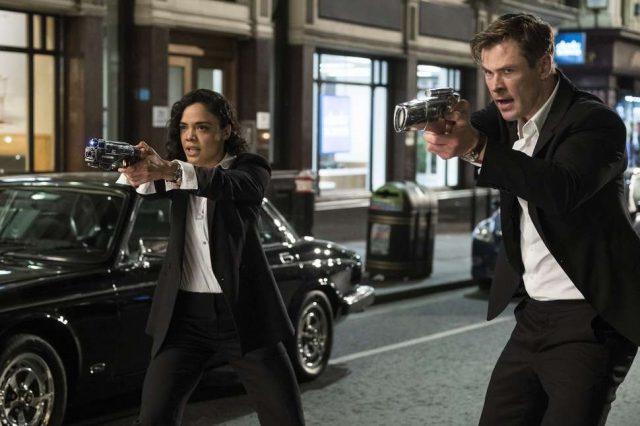
Immediately, Molly having to serve as the eyes of the audience feels tedious, particularly for established Men in Black fans, who already saw Will Smith do a much better job of introducing moviegoers to this world in the original 1997 movie. Thompson manages to deliver some fun spirit to M’s character, but ultimately, M is every stereotypical conspiracy theorist protagonist that ends up being swept up into the very world that they’re pursuing, right after no one believes them about it. Likewise, there isn’t much to H’s character either, who is more or less just a goof, almost delivering a less over-the-top stupid variation of what Hemsworth portrayed as the male secretary in 2016’s ill-fated Ghostbusters reboot. Obviously, you’re not supposed to know much about the MIB personalities, but even then, there’s no intrigue to the world in Men in Black: International. Rather than having personalities that feel effectively left up to the imagination, this movie instead merely delivers personalities that feel underdeveloped and uninteresting.
Again though, Hemsworth and Thompson do display great on-screen chemistry, and that does help to salvage the otherwise unremarkable cast of characters on display. Likewise, Kumail Nanjiani’s alien sidekick, Pawny, who joins M and H during Men in Black: International’s second half, also manages to be a surprising bright spot, with Nanjiani taking on a role that could have easily been very annoying, and making it surprisingly endearing and likable. The same is true of a three-armed alien arms dealer named Riza Stavros, portrayed in a surprisingly fun turn by Rebecca Ferguson, but Riza is frustratingly relegated to just one sequence, so you only have a short amount of time to enjoy Ferguson’s highlight role. Riza’s diminished role is one of the most baffling elements of Men in Black: International, in fact. She would have made a far better lead villain than the threat that the movie actually attempts!
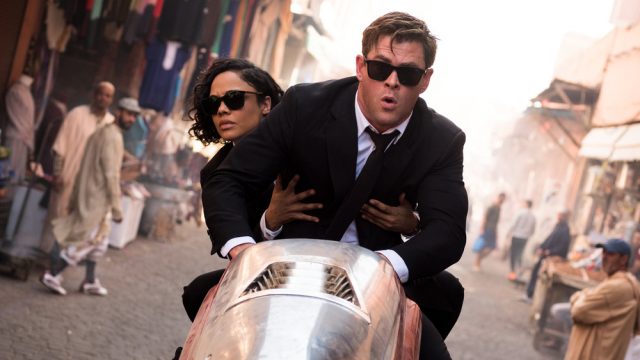
On top of being saddled with a disappointingly unmemorable threat to Earth in Men in Black: International, so many other actors are plain and simply wasted here as well. Liam Neeson is given frustratingly little to work with as H’s former partner, Agent, “High T”, with Neeson doing little more than serving as a plot and exposition device. Emma Thompson meanwhile actually returns from the previous Men in Black 3 as MIB director, Agent O, as a loose connecting thread to the former Men in Black trilogy, but she’s also given nothing to do but recruit M, then walk out of the movie for the most part. Rafe Spall is at least allowed to be something of a foil as Agent C, an MIB agent that dedicates all of his time to scrutinizing H, but the C/H conflict barely feels like it matters, with the movie ultimately shrugging it off when it would rather focus on easy resolutions. The new supporting cast does have their moments of fun here and there, but they fail to compare to the original Men in Black trilogy’s many recognizable personalities, who all felt significantly more creative and significantly more entertaining.
Men in Black: International at least attempts to hit upon some interesting ideas. It attempts to examine a more globalized, inclusive take on the world, and how this has affected MIB, namely with the organization’s mission no longer being about, “Protecting the Earth from the scum of the universe”, and instead being more about finding excuses to shelter and accommodate any and all alien species that make their way to Earth. There’s a smarter and more insightful movie screaming to get out here, one that clearly has something to say about immigration, foreign policy and the duty that an overseeing authority would now have in a world that doesn’t want them to operate with extreme prejudice anymore. This could have been a more modern and interesting take on the Men in Black formula, but it’s just too often tripped up by the storyline being aggressively boilerplate and uninteresting.
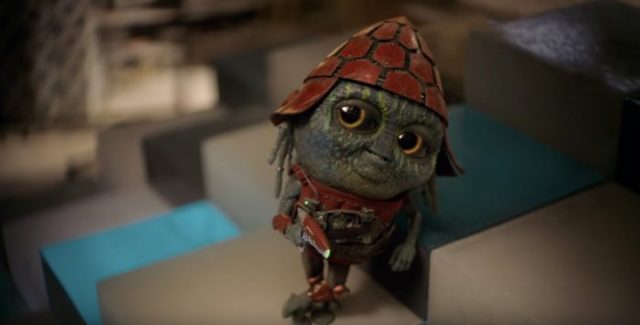
For all of its initial big ideas and desires to reinvent the Men in Black movies for a post-Will Smith/Tommy Lee Jones era, Men in Black: International feels like it’s retreading far too many story elements from the previous movies. Once again, a plucky young recruit is taken into the MIB organization, left to discover everything for the first time (though admittedly, Chris Hemsworth’s dopey, womanizing and narcissistic Agent H deviates from the gruff, no-nonsense Agent K that Tommy Lee Jones formerly portrayed), before a hostile alien force threatens the planet, and the new recruit and his veteran partner become the only means of stopping it. Oh, and there’s a goofy alien sidekick that sometimes hangs out with them, to contribute comic relief once the establishment is out of the way. There’s a few more smaller details, but that’s really the long and short of the storyline in Men in Black: International, which is taken straight from the Men in Black movies’ regular playbook, practically unaltered.
Among the many frustrations in Men in Black: International, one of the worst is the fact that its storytelling is so incredibly forgettable. This follow-up is a far cry from the sheer imagination of the much-beloved original Men in Black movie from 1997, which it’s clearly trying to nick the storytelling formula from to a considerable degree. Making matters worse is that the form-stealing alien antagonists, the Hive, are equally forgettable and underwhelming, despite a twist with their characters that attempts to turn the movie on its head in the third act, but only manages to open up a slew of contrivances and plot holes. Even the body-stealing gimmick of the Hive is a complete waste here, particularly in a year that seems to be strangely fond of shapeshifting alien antagonists in blockbuster comic book movies, after Marvel Studios’ Captain Marvel and 20th Century Fox’s Dark Phoenix also featured them. Rather than make Men in Black feel genuinely fresh again, Men in Black: International’s storyline simply accomplishes the opposite, highlighting how tired and out of ideas the franchise ultimately is by this point.
With former Men in Black trilogy director, Barry Sonnenfeld now relegated to a mere producing role in Men in Black: International, directing duties are instead taken up by F. Gary Gray. Gray has managed some pretty decent blockbusters in the past as well, between helming the 2003 remake of The Italian Job, NWA biopic, Straight Outta Compton, and big-budget action sequel, The Fate of the Furious being particular highlights in his directing catalogue. Despite seemingly good intentions however, Gray just can’t recapture the exciting magic of his best directing efforts in Men in Black: International. This movie blatantly feels like work-for-hire for Gray, and not a real passion project that he can bring any genuine degree of inspiration to.
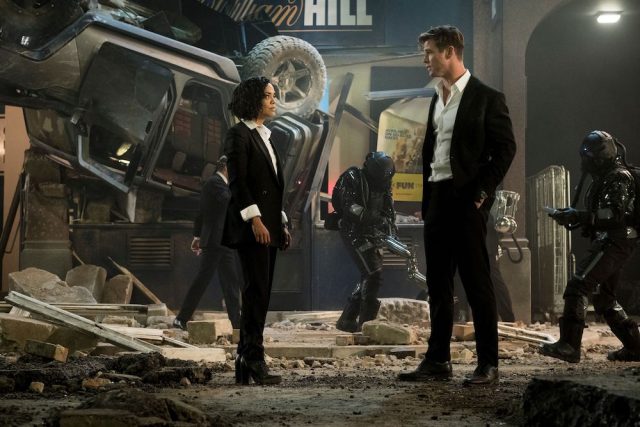
The issues with Gray’s directing in Men in Black: International become most apparent during the action scenes, which feel very off, and almost completely lack a real sense of impact or excitement. This is a huge problem in a movie about an organization that supposedly fights aliens bent on the conquest of Earth! Hemsworth’s and Thompson’s innate chemistry at least helps to offset this lack of thrills, and some of the world-building in the movie is fine too I suppose, but Men in Black: International pretty much completely lacking urgency means that it will likely fail to engage most viewers throughout its runtime. It always comes so close to being interesting, especially when the comedic timing manages to land, but before it can truly get off the ground, Men in Black: International fails to muster the appropriate enthusiasm, leaving what should be its money shots to instead fall flat with a resounding thud.
Men in Black: International’s soundtrack comes courtesy of two composers, with one being series veteran, Danny Elfman, who composed the entire original Men in Black trilogy’s music, and the other being newcomer, Chris Bacon, best known for Gnomeo & Juliet and its sequel, Sherlock Gnomes. This creates a bit of a bizarre clash of music styles, since it appears that Bacon’s original score treatment may have been too juvenile, with Elfman then being summoned to make it more true to the original Men in Black movies. Even then however, so much of Men in Black: International’s soundtrack plays off as if it were made for a kids’ movie, which is very strange, since Men in Black as a franchise, while having some appeal for children, never really presented itself with kids as its main target audience. Making this music direction even more confounding is that many people with the most established attachment to Men in Black would logically be adults, so if anything, Men in Black: International should be making a conscious effort to not come off distinctly juvenile!

Of course, on the flip side, it’s also evident that the super-energized score is trying to compensate for the many shortcomings of the writing in Men in Black: International, working overtime to try and desperately convince the audience that something interesting is going on. Ironically however, the sound mixing feels weirdly lightweight, furthering the lacklustre action direction, and contributing to the movie’s action scenes failing to register much of the time. Some of the comedy-based audio still works alright, and not all of the action scenes are completely without punch, but a lot of the attempts at thrills in Men in Black: International just don’t often seem to work. The movie leans too far into feeling unreal and cartoon-ish in its audio design, which is just one reason why it feels impossible to truly invest in the supposedly world-threatening stakes behind the storyline.
Barry Sonnenfeld’s outstanding creature makeup and overall visual inspiration behind the previous Men in Black trilogy is sorely missed in Men in Black: International. This soft reboot for the franchise is a mess of undercooked, unconvincing CGI, which makes for a very poor replacement to the many practical alien effects that Sonnenfeld put together for the previous Men in Black movies. The set design is still alright, particularly for recognizable locations like MIB headquarters, but the creature design in Men in Black: International is very lacklustre. None of the aliens truly feel real or believable in this offshoot. A big part of the reason why the world of the Men in Black movies felt so much more immersive in the former trilogy is because of Barry Sonnenfeld’s practical make-up and alien costume design, which made all of the imaginative, eccentric aliens of the franchise’s world feel real, and like they were actually there. Men in Black: International, by contrast, feels too much like a video game, and even that may be over-selling it, since even many modern video games feel more lifelike and immersive than what this movie delivers!

My screening of Men in Black: International didn’t include a 3D presentation, so I can’t comment on the quality of the 3D in this case. I did however see the movie in an IMAX theatre, which does manage to bump up the scope of the visuals a tad, even if premium formats like IMAX do very little for the underwhelming audio suite. The IMAX screen doesn’t do the bad alien effects any favours either, merely highlighting all the more how they don’t feel truly present or believable. Maybe the 3D cut can possibly add some extra engagement, but with the action scenes being as dull as they are, I doubt that the 3D would truly be worth shelling out for here. Frankly, Men in Black: International feels visually underwhelming in any format, taking many frustrating steps backwards from the significantly more technically impressive Men in Black trilogy that preceded it.
Men in Black: International is unfortunately a total misfire. Men in Black has always deserved to be a great blockbuster franchise in the Sony Pictures catalogue, but it just can’t seem to recapture that outstanding charm behind the original 1997 movie, even now. Men in Black: International is so far the series’ weakest attempt to do so as well! Thompson and Hemsworth do their very best to make something out of the meager material that they’ve been given, but their talents alone can’t save an undercooked and underwhelming spin-off that’s plain and simply dead-on-arrival. If Sony was hoping to build yet another shared cinematic universe under the Men in Black label with Men in Black: International, which the movie’s marketing was clearly flirting with, they’ve failed miserably.
Yet again, it feels like this latest attempt by Sony to kickstart a new spin on an old movie franchise is a non-starter, suggesting that perhaps Men in Black’s cinematic world should have been left alone after losing its former lead stars. Most of the new characters in Men in Black: International are dull, despite the leads at least being passable, plus the newest Men in Black movie storyline simply feels like a retread of the most basic foundation behind a Men in Black movie to boot, never managing to be anything other than tedious, rehashed fluff. Even the visual design throughout much of Men in Black: International is incredibly disappointing, with the overabundance of lacklustre CGI aliens no doubt leaving viewers desperate for the days of Barry Sonnenfeld’s awesome practical alien effects, which positively oozed with imagination.
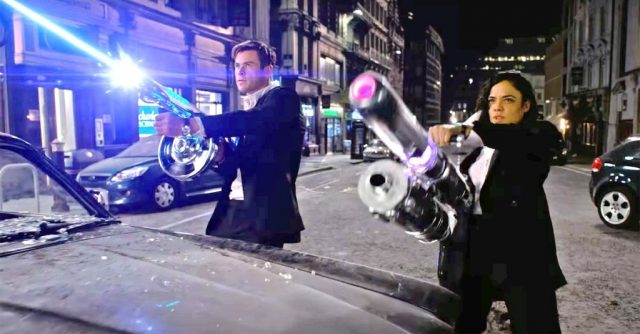
That’s the main thing that defeats Men in Black: International at every turn; It lacks imagination. This feels like the very definition of a studio-mandated, design-by-committee blockbuster spin-off, one that needlessly digs up a dormant old franchise for its own sake, without contributing anything truly novel or meaningful for said franchise in a new incarnation. Even die-hard fans of Men in Black will likely wonder why Sony even bothered with Men in Black: International. It’s so utterly pointless and forgettable that you’ll wonder if you yourself were neuralyzed on the way out of the theatre.

